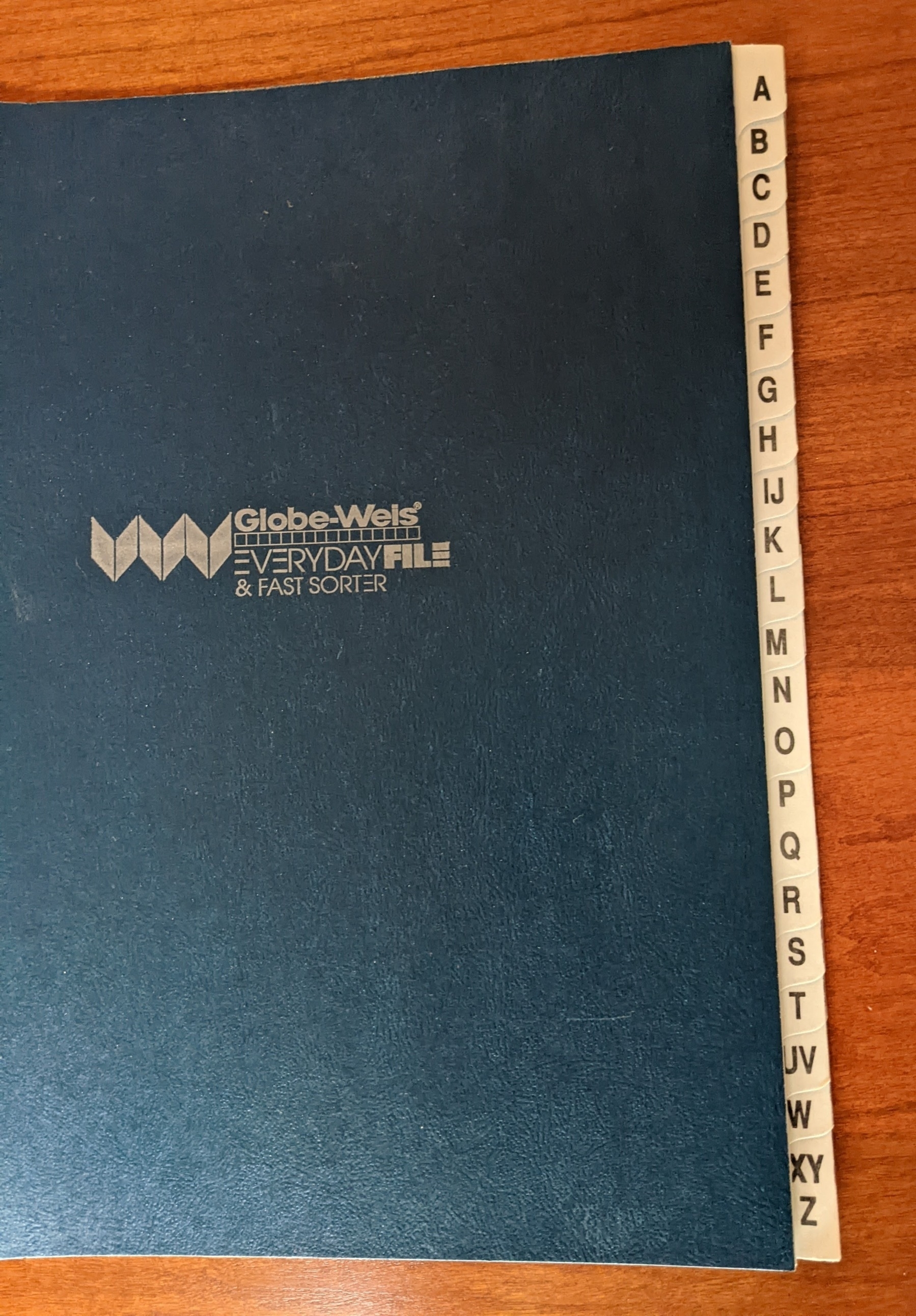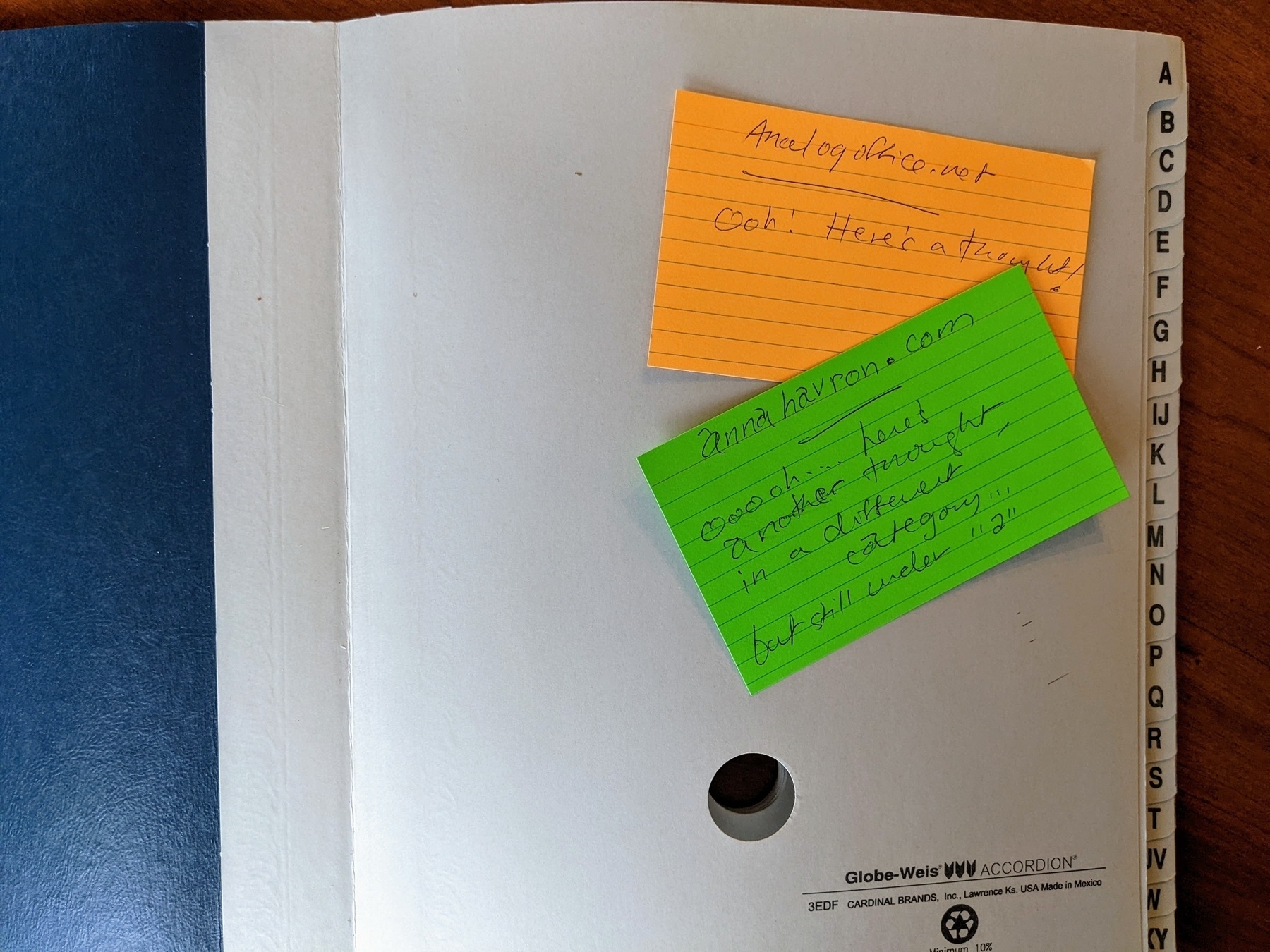Office Toy: the A-Z Sorter
Once upon a time I worked in a medical office, which was transitioning from paper records to electronic records. Every week, several hundred papers came through, and they all had to be filed alphabetically by patient name. (The paper records system was a backup for the computer network, which was not always reliable.)
Enter the A-Z file sorter:

As the papers streamed in, the records manager could glance at the patient’s last name and put the papers in the file sorter. Names beginning with “A” would go into the “A” slot, and so on, from Aethelred to Zarathustra.
At the end of the day, you might have five papers tossed into the “A” section where someone’s last name begins with an A — but it’s a lot easier to file five papers in the “A” slot, and then file whatever’s in the “B” slot, than it is to have a jumble of 40-odd records that need to go somewhere in a floor-to-ceiling wall of thousands of files.
But now we’ll put away the retrospectoscope, because A-Z file sorters can still earn their keep outside of a Y2K era medical practice.
A-Z Sorters for the Socially Anxious, or Security Minded, or Both
David Rockefeller kept a stupendous analog contact manager: 200,000 index cards — filed alphabetically, and regularly, meticulously updated — with notes about everyone he met. A good contact management system is one way introverts can thrive in circumstances that require them to perform as extroverts:
Growing up, David admired his charming and gregarious older brother for his natural ability to inspire loyalty and camaraderie. John always knew the right thing to say to make people feel comfortable and engaged, easily earning their trust and affection. “Socially,” David would later say in his book Memoirs, compared to his brother John, “I felt like a misfit.” (Clay, undated)
David realized that his network was key to his professional success. So he tapped into his superpower, which was keeping written records.
Or perhaps you don’t suffer from social anxiety, but you want to keep contact information that cannot wander online.
Say you go to a big conference, collecting business cards and stories. Maybe at some point a martini* gets involved. You can scribble down some notes, and throw your notes and various business cards into your A-Z file sorter to organize later. (Assuming you can read what you wrote, after that martini.)
A-Z Sorters for Note Makers and Writers
Many writers keep handwritten notes. Some writers favor notebooks for their observations, and others favor index cards, organized by topic.
Ryan Holiday’s reference files for his books on stoicism, are analog. He writes down quotes, insights, anecdotes, and observations on 4x6 index cards, organized alphabetically by topic, that he mines later. It is his wisdom bank.
Some of my categories for those who are curious: Life. Death. Writing. Stoicism. Strategy. Animals. Narrative Fallacy. Books. Article Ideas. Education. Arguing with Reality. Misc. (Holiday 2013)
Austin Kleon highlighted the analog systems of 20th century comedians: Phyllis Diller’s and Joan Rivers’ joke banks, and George Carlin’s hybrid system.
In an interview with Psychology Today, Carlin talked about the iterative process of revisiting his paper notes:
So if I write something down, some observation—I see something on television that reminds me of something I wanted to say already—the first time I write it, the first time I hear it, it makes an impression. The first time I write it down, it makes a second impression, a deeper path. Every time I look at that piece of paper, until I file it in my file, each time, the path gets a little richer and deeper so that these things are all in there. (Psychology Today, 2008)
Let’s say I wrote a blizzard of notes, under all kinds of categories, and it just feels overwhelming to file them. Here’s an example of using an A-Z file sorter, with two notes I want to file under “a,” for the names of my blogs:

I am a writer who uses notebooks, but maybe I’ll start playing with recording ideas on index cards. When you use a different method, you take different kinds of notes; and it’s fun to explore. If I do try out index cards and categories, I’ll be using the A-Z sorter to wrangle them in order.
+ + + +
References
Flynn, S. (2017) David Rockefeller’s Rolodex of 200,000 cards details historic figures, Mail Online. Available at: www.dailymail.co.uk/news/arti… (Accessed: 25 January 2022).
Clay (no date) David Rockefeller and His Rolodex of Index Cards, Clay. Available at: clay.earth/story (Accessed: 25 January 2022).
‘How And Why To Keep A “Commonplace Book”’ (2013) Thought Catalog, 28 August. Available at: https://thoughtcatalog.com/ryan-holiday/2013/08/how-and-why-to-keep-a-commonplace-book/ (Accessed: 25 January 2022).
Indexing, filing systems, and the art of finding what you have (2021) Austin Kleon. Available at: https://austinkleon.com/2021/05/20/indexing-filing-systems-and-the-art-of-finding-what-you-have/ (Accessed: 25 January 2022).
George Carlin’s Last Interview | Psychology Today (2008). Available at: www.psychologytoday.com/us/blog/b… (Accessed: 25 January 2022).
Notes
* Not all conferences involve martinis; but not all don’t, either.